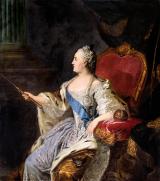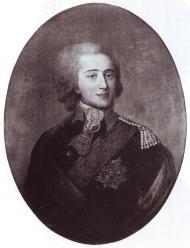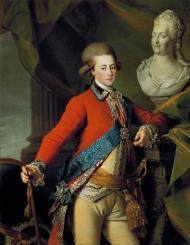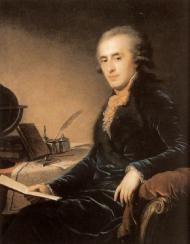Who dated Catherine II of Russia?
Alexander Yermolov dated Catherine II of Russia from ? until ?.
Ivan Rimsky-Korsakov dated Catherine II of Russia from ? until ?. The age gap was 24 years, 8 months and 22 days.
Alexander Dmitriev-Mamonov dated Catherine II of Russia from ? until ?. The age gap was 29 years, 4 months and 28 days.
Alexander Lanskoy dated Catherine II of Russia from ? until ?. The age gap was 28 years, 10 months and 6 days.
Sergei Saltykov dated Catherine II of Russia from ? until ?.
Pyotr Zavadovsky dated Catherine II of Russia from ? until ?. The age gap was 9 years, 8 months and 19 days.
Semyon Zorich dated Catherine II of Russia from ? until ?.
Alexander Vasilchikov dated Catherine II of Russia from ? until ?.
Platon Zubov dated Catherine II of Russia from ? until ?. The age gap was 38 years, 6 months and 24 days.
Gregory Potyomkin dated Catherine II of Russia from ? until ?. The age gap was 10 years, 4 months and 22 days.
Grigory Orlov dated Catherine II of Russia from ? until ?. The age gap was 5 years, 5 months and 15 days.
Stanisław August Poniatowski dated Catherine II of Russia from ? until ?. The age gap was 2 years, 8 months and 15 days.
Catherine II of Russia

Catherine II (born Princess Sophia Augusta Frederica of Anhalt-Zerbst; 2 May 1729 – 17 November 1796), commonly known as Catherine the Great, was the reigning Empress of Russia from 1762 to 1796. She came to power after a coup d'etat against her husband, Peter III. Her long reign helped Russia thrive under a golden age during the Enlightenment. This renaissance led to the founding of many new cities, universities, and theatres, along with large-scale immigration from the rest of Europe and the recognition of Russia as one of the great powers of Europe.
After overthrowing and possibly assassinating her husband and her subsequent rule of the Russian Empire, Catherine often relied on noble favourites such as Count Grigory Orlov and Grigory Potemkin. Assisted by highly successful generals such as Alexander Suvorov and Pyotr Rumyantsev and admirals such as Samuel Greig and Fyodor Ushakov, she governed at a time when the Russian Empire was expanding rapidly by conquest and diplomacy. In the west, she installed her former lover to the throne of Poland, which was eventually partitioned. In the south, the Crimean Khanate was annexed following victories over the Bar Confederation and the Ottoman Empire in the Russo-Turkish War. With the support of Great Britain, Russia colonised the territories of New Russia along the coasts of the Black and Azov seas. In the east, Russians became the first Europeans to colonise Alaska, establishing Russian America.
Many cities and towns were founded on Catherine's orders in the newly conquered lands, most notably Yekaterinoslav, Kherson, Nikolayev, and Sevastopol. An admirer of Peter the Great, Catherine continued to modernise Russia along Western European culture. However, military conscription and the economy continued to depend on serfdom, and the increasing demands of the state and of private landowners intensified the exploitation of serf labour. This was one of the chief reasons behind rebellions, including Pugachev's Rebellion of Cossacks, nomads, peoples of the Volga, and peasants.
The Manifesto on Freedom of the Nobility, issued during the short reign of Peter III and confirmed by Catherine, freed Russian nobles from compulsory military or state service. The construction of many mansions of the nobility in the classical style endorsed by the empress changed the face of the country. She is often included in the ranks of the enlightened despots. Catherine presided over the age of the Russian Enlightenment and established the Smolny Institute of Noble Maidens, the first state-financed higher education institution for women in Europe.
Read more...Alexander Yermolov

Alexander Petrovich Yermolov (1754–1834) was a Russian favourite and the lover of Catherine the Great from 1785 to 1786.
Yermolov was presented to Catherine by Grigory Potemkin, tested by Anna Protasova and became Catherine's lover in 1785. He collaborated with the enemies of Potemkin and attempted to have Potemkin removed, and thereby lost his position. He went to Paris in the late 1780s and spent the rest of his life in Schloss Frohsdorf.
Read more...Catherine II of Russia

Ivan Rimsky-Korsakov

Ivan Nikolajevich Rimsky-Korsakov, né Korsav (29 June 1754 – 31 July 1831 in Saint Petersburg, Russian Empire) was a Russian courtier and lover of Catherine the Great from 1778 to 1779.
Read more...Catherine II of Russia

Alexander Dmitriev-Mamonov

Count Alexander Matveyevich Dmitriev-Mamonov (Russian: Александр Матвеевич Дмитриев-Мамонов; 30 September 1758 – 11 October 1803, buried in Donskoy Monastery) was a lover of Catherine II of Russia from 1786 to 1789.
Read more...Catherine II of Russia

Alexander Lanskoy

Alexander Dmitrievich Lanskoy, also called Sashin'ka or Sasha, (19 March [O.S. 8 March] 1758 – 6 July [O.S. 25 June] 1784) was a Russian general, favourite and lover of Catherine the Great between 1780 and 1784. It has been said that "[a] look at [her] correspondence with her favorites gives the impression she only had tender feelings for one, Alexander Lanskoi."
Read more...Catherine II of Russia

Sergei Saltykov

Count Sergei Vasilievich Saltykov (Russian: Сергей Васильевич Салтыков, IPA: [sʲɪrˈɡʲej vɐˈsʲilʲjɪvʲɪtɕ səltɨˈkof]; c. 1722 – 1784) was a Russian officer (chamberlain) who became the first lover of Empress Catherine the Great after her arrival in Russia.
Read more...Catherine II of Russia

Pyotr Zavadovsky

Le comte Piotr Vassilievitch Zavadovsky (Пётр Васильевич Завадовский), né à Krasnovitchi, près de Briansk le 10 (21) et mort le 10 (22) à Saint-Pétersbourg, est un homme politique russe, ministre de l'Instruction publique du au . Il compta semble-t-il au nombre des amants de Catherine la Grande et fut son favori de 1775 à 1777.
Read more...Catherine II of Russia

Semyon Zorich

Count Semyon Zorich (1743–1799) was a Serbian-born Russian lieutenant-general and count of the Holy Roman Empire. He served Russia against the Prussians and Turks. A member of the Russian court, he was presented to Empress Catherine the Great by Grigory Potemkin and, after having been tested by Praskovja Bruce and doctor Rogerson, became the Empress' lover. He was most influential in the commercial development of Shklov and Mogilev.
Read more...Catherine II of Russia

Alexander Vasilchikov

Alexander Semyonovich Vasilchikov (Russian: Александр Семёнович Васильчиков, tr. Aleksandr Semënovič Vasil'čikov; 1746–1813) was a Russian aristocrat who became the lover of Catherine the Great from 1772 to 1774.
Vasilchikov was an ensign in the Chevalier Guard Regiment when he was noted by Catherine and was appointed gentleman of the bedchamber on 1 August 1772. When Catherine's then-lover Grigory Grigoryevich Orlov left court, Catherine was informed about his adultery, and 12 August, Vasilchikov was made general aide-de-camp and lover of Catherine. Vasilchikov was expected to be available to attend on her at all times, and was not allowed to leave the palace without permission.
The relationship was short-lived. Catherine found Vasilchikov's gentleness cloying, saying "His tenderness made me weep." When Vasilchikov was away on a journey, sent by the empress, Grigory Potemkin replaced him as her lover. She wrote to her friend Friedrich Melchior, Baron von Grimm about Vasilchikov's dismissal: "Why do you reproach me because I dismiss a well-meaning but extremely boring bourgeois in favour of one of the greatest, the most comical and amusing, characters of this iron century?"
Vasilchikov later complained that he felt like a hired gigolo: "I was nothing more to her than a kind of male cocotte and I was treated as such. If I made a request for myself or anyone else, she did not reply, but the next day I found a bank-note for several thousand rubles in my pocket. She never condescended to discuss with me any matters that lay close to my heart."
Catherine characteristically rewarded her former lover richly. Vasilchikov was given a pension of twenty thousand rubles and valuable properties. He lived the rest of his life in Moscow. He never married. He built a notable collection of Western European paintings and sculptures, including a "Self Portrait" by Velasquez and works by Philips Wouwerman and Andries Botha.
Read more...Catherine II of Russia

Platon Zubov

Prince Platon Alexandrovich Zubov (Russian: Платон Александрович Зубов; November 26 [O.S. November 15] 1767 – April 19 [O.S. April 7] 1822) was the last of Catherine the Great's favourites and the most powerful man in the Russian Empire during the last years of her reign.
Read more...Catherine II of Russia

Gregory Potyomkin

Prince Grigory Aleksandrovich Potemkin-Tauricheski (11 October [O.S. 30 September] 1739 – 16 October [O.S. 5 October] 1791) was a Russian military leader, statesman, nobleman, and favourite of Catherine the Great. He died during negotiations over the Treaty of Iași, which ended a war with the Ottoman Empire that he had overseen.
Potemkin was born into a family of middle-income landowners of Russian nobility. He first attracted Catherine's favor for helping in her 1762 coup, then distinguished himself as a military commander in the Russo-Turkish War (1768–1774). He became Catherine's lover, favorite and possibly her consort. After their passion cooled, he remained her lifelong friend and favored statesman. Catherine obtained for him the title of Prince of the Holy Roman Empire and gave him the title of Prince of the Russian Empire among many others: he was both a Grand Admiral and the head of all of Russia's land and irregular forces. Potemkin's achievements include the peaceful annexation of the Crimea (1783) and the successful second Russo-Turkish War (1787–1792), during which the armed forces under his command besieged Ochakov.
In 1775, Potemkin became the governor-general of Russia's new southern provinces. An absolute ruler, he worked to colonize the wild steppes, controversially dealing firmly with the Cossacks who lived there. He founded the towns of Kherson, Nikolayev, Sevastopol, and Yekaterinoslav. Ports in the region became bases for his new Black Sea Fleet.
His rule in the south is associated with the (probably mythical) "Potemkin village", a ruse involving the construction of painted façades to mimic real villages, full of happy, well-fed people, for visiting officials to see. Potemkin was known for his love of women, gambling and material wealth. He oversaw the construction of many historically significant buildings, including the Tauride Palace in Saint Petersburg.
Read more...Catherine II of Russia

Grigory Orlov

Prince Grigory Grigoryevich Orlov (Russian: Григорий Григорьевич Орлов; 17 October 1734 – 24 April 1783) was a favourite of the Empress Catherine the Great of Russia, Prince of the Holy Roman Empire (1772), state and military figure, collector, patron of arts, and General-in-Chief.
He patronised M. V. Lomonosov, D. I. Fonvisin, V. I. Bazhenov and gave them financial support. Honorary member of the Imperial Academy of Arts (since 1765). He collected paintings (including Rembrandt, P. P. Rubens, Titian), sculpture, Chinese, Japanese and Russian porcelain, hunting weapons, etc. (Orlov's collection has been preserved almost completely; it is now in the State Museum-Reserve "Gatchina" of the eponymous city). A large landowner, particularly of the Gatchina manor, where Orlov commissioned the construction of a palace and a landscape garden.
He became a leader of the 1762 coup which overthrew Catherine's husband Peter III of Russia and installed Catherine as empress. For some years he was virtually co-ruler with her, but his repeated infidelities and the enmity of Catherine's other advisers led to his fall from power.
Read more...Catherine II of Russia

Stanisław August Poniatowski

Stanislas II (en polonais : Stanisław August), de son vrai nom Stanisław Antoni Poniatowski, né le à Wołczyn (actuelle Biélorussie) et mort le à Saint-Pétersbourg, est, de 1764 à 1795, le dernier roi de Pologne et grand-duc de Lituanie, à l'époque de la République des Deux Nations.
Selon la titulature officielle, il est « par la grâce de Dieu et la volonté du peuple, roi de Pologne, grand-duc de Lituanie et duc de Ruthénie, Prusse, Mazovie, Samogitie, Kiev, Volhynie, Podolie, Podlasie, Livonie, Smolensk, Siewierz et Czernihów. »
Son règne a connu bien des vicissitudes. En 1762, son ancienne maîtresse, la princesse russe d'origine allemande Catherine, née Sophie Frédérique Augusta d'Anhalt-Zerbst, devient impératrice de Russie sous le nom de Catherine II. En 1764, après la mort d'Auguste III, Poniatowski est élu roi de Pologne en tant que candidat de la Russie et de la famille Czartoryski, qui est favorable à l'alliance étroite de la Pologne avec la Russie. Celle-ci, secondée par la Prusse, joue un rôle important au début du règne de Stanislas II, par le biais de son ambassadeur à Varsovie Nicolas Repnine.
La révolte d'une partie de la noblesse hostile à la Russie, liguée dans la confédération de Bar (1768-1772), aboutit au premier partage de la Pologne (1772). Stanislas II, maintenu sur le trône du fait de la défaite des confédérés, s'efforce alors de promouvoir un certain nombre de réformes, dont on peut citer la création de la Commission de l'Éducation nationale (1773), dans la limite de ce que son protecteur russe peut accepter.
Mais à la fin des années 1780, le mouvement de réforme prend une telle ampleur, à l'époque de la Grande Diète (1788-1792), qu'elle suscite l'hostilité de la Russie, dirigée par Catherine II jusqu'en 1796 : la promulgation de la Constitution du , la première en Europe, est l'origine directe de la guerre russo-polonaise de 1792, dont la suite est le deuxième partage de la Pologne (1793) et la soumission de Stanislas au parti pro-russe de la confédération de Targowica. En 1794, Stanislas apporte toutefois un certain soutien à l'insurrection dirigée par Tadeusz Kościuszko contre la Russie. Sa défaite aboutit au troisième partage de la Pologne en 1795 : privée de la totalité de son territoire, la république des Deux Nations cesse d'exister et Stanislas est contraint d'abdiquer, pour aller finir sa vie à Saint-Pétersbourg, au début du règne de Paul Ier.
Read more...